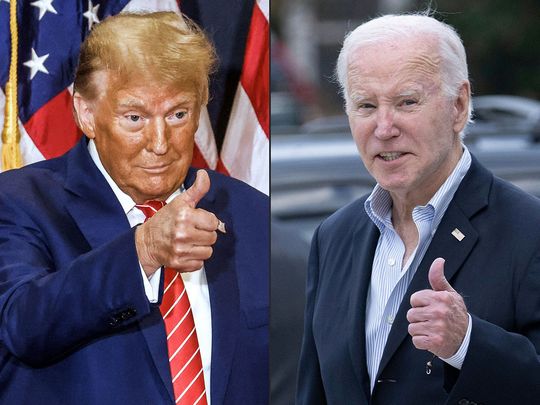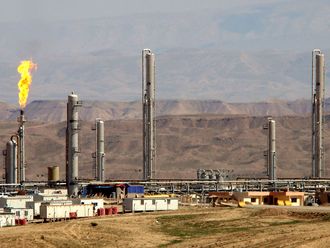
Former President Donald Trump is poised for a face-off with President Joe Biden in November’s US presidential elections.
Despite a storm of legal challenges, Trump’s campaign juggernaut rolls on, with polls suggesting a lead over Biden. Trump’s decision to run again puts him among a small group of ex-presidents who have subsequently run for office.
Equally unique are the many lawsuits against an ex-president. Both candidates are also among the most aged to run for the US high office - Biden is already the oldest person in history to have been inaugurated president at 78. By the next inauguration date in January 2025, Biden will be 82.
We examine the odds of a Trump re-election and the potential implications on policies and financial markets.
Incumbent’s edge
History favours a sitting president. An incumbent is re-elected almost 60 per cent of the time, and 75 per cent of the time if there is no recession in an election year. However, the 2024 race is shaping up to be an anomaly. President Biden’s tenure has been marked by a global pandemic, economic upheaval, and social unrest. While the economy has shown signs of recovery, the public’s perception of economic stability remains mixed, as seen in Biden’s weak approval ratings.
Early polls are typically weak predictors of final outcome. There is certainly room for Biden to improve. Continued economic stability may favour Biden, but Trump’s polling resilience points to a tight race in 2024.
Meanwhile, Trump, despite facing an array of legal challenges that would typically sideline a political figure, continued to demonstrate resilience in the polls, with the legal onslaught against him ironically galvanising his supporters. The narrative of defiance has kept Trump’s popularity neck-in-neck, or sometimes even greater than President Biden’s.
What might Trump’s second term bring?
Most polls show that the US government is likely to be divided. A divided government could see Trump pivot to the use of executive powers, focusing on trade and global affairs. However, a Republican sweep of the While House, the House and the Senate could bring Trump’s full policy agenda into play, with implication for trade and foreign policy. Here, we explore key policies expected under Trump:
Extend or lower 2017 corporate tax cuts
This would be bullish for corporate profits. However, tax cuts may come later than expected depending on the legislative priority of the Congress. If the Congress focuses first on immigration, this may blunt the stimulative impact of tax cuts, especially if other growth-negative policies take effect or as investors begin to focus on the US’s challenging fiscal outlook. According to a recent report by the Congressional Budget office, extending Trump’s tax cuts would add US$3.5 trillion to the deficit through 2033, potentially weighing on the dollar and lifting bond yields.
Immigration and border security
This is an underappreciated risk, and one where Trump can exercise significant executive power to restrict both legal and illegal immigration. A growing share of voters in swing states are identifying immigration as a top issue for the 2024 election. Over the longer term, limits on immigration would cause a significant slowdown in US labour force growth and contribute to higher wages and inflation.
Trade
Trade policy represents the greatest cyclical risk to investors. Trump’s second term could bring about a more hawkish approach to China and the rest of the world, given Trump’s plan to use tariffs and extend investment restrictions beyond national security concerns.
Since Trump would be ineligible for a third term as president, the lack of electoral constraints in his second term could well see his campaign threat of imposing more than 60 per cent tariffs on China imports materialise, at least as an initial negotiating stance. Global trade could well suffer a shock from both US protectionism and global retaliation.
Foreign policy
Trump’s foreign policy moves could heighten tensions. Under Trump, US’s financial and military assistance to other countries will be subject to even greater scrutiny. Any withdrawal of support for Ukraine could compel the nation to negotiate a ceasefire with Russia.
The net result is likely to be a continued rise in global defence spending.
Mixed market implications from a Trump win
Historically, equity market performance during election years has tended to be positive. Since the 1928 US presidential election, the S&P 500 has registered negative returns in only 6 out of 24 election years, boasting average returns of 7.5 per cent.
Markets have shown a preference for status quo, with better returns typically in years the incumbent party retains the presidency. Additionally, a divided Congress, which often results in limited legislative changes, has also been favourably perceived by markets.
Existing economic conditions is also an important factor. If a recession has already occurred, any inflationary policies by the Trump administration may be welcomed by financial markets. Otherwise, inflation risks may re-emerge, leading to a hawkish turn in the Fed’s policy stance, thereby hurting risk assets.
The performance of the equity market is also contingent on the election outcome for the House and the Senate. For instance, a divided government could see Trump pivot to the use of executive powers, focusing on trade and tariffs. This could adversely affect equity markets in the rest of world, particularly in Europe and China.
US equities could also face headwinds from retaliatory measures from its trade partners. This could lend support to a stronger US dollar or add to inflationary pressure, which would in turn weigh on bonds.
In the event of a Republican clean sweep, the sequencing of policies will be important to monitor. A legislative priority of immigration over tax cuts, alongside the imposition of tariffs, could be negative for risk assets.









